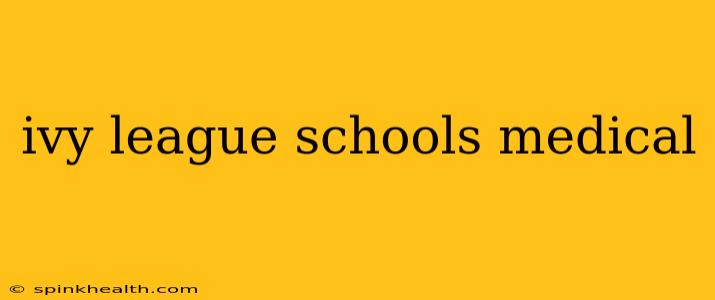The allure of Ivy League schools extends far beyond their prestigious undergraduate programs. Their medical schools, consistently ranked among the best in the world, attract top-tier students and faculty, fostering groundbreaking research and exceptional medical training. But what exactly sets these institutions apart? This isn't just about name recognition; it's about a unique combination of resources, faculty, and research opportunities that shape the future of medicine. Let's unravel the mystique and delve into what makes Ivy League medical schools so highly sought after.
What Makes Ivy League Medical Schools So Competitive?
The sheer competitiveness of Ivy League medical schools is legendary. Imagine a world where even the most exceptional students face a daunting acceptance rate. This fierce competition stems from several factors: the prestige of the name, the unparalleled resources available to students and faculty, the groundbreaking research conducted within their walls, and the extensive network of alumni and connections that open doors to incredible opportunities. Getting in is a monumental achievement, often requiring years of dedicated preparation and an almost flawless academic record.
Which Ivy League Schools Offer Medical Programs?
All eight Ivy League universities boast renowned medical schools:
- Columbia University Vagelos College of Physicians and Surgeons: Located in New York City, it offers unparalleled access to diverse patient populations and cutting-edge research facilities.
- Cornell University Weill Cornell Medicine: Also situated in New York City, it emphasizes collaborative research and a strong focus on translational medicine, bringing research discoveries to the bedside.
- Dartmouth College Geisel School of Medicine: Known for its intimate learning environment and strong emphasis on primary care, it offers a unique blend of community-based learning and cutting-edge research.
- Harvard Medical School (HMS): A global leader in medical education and research, HMS boasts a vast network of affiliated hospitals and research centers, providing students with unparalleled opportunities.
- University of Pennsylvania Perelman School of Medicine: Located in Philadelphia, it combines a strong clinical training program with a vibrant research environment, leading to significant advancements in various medical fields.
- Brown University Warren Alpert Medical School: This school is known for its innovative curriculum, emphasizing problem-based learning and integrating social sciences into the medical curriculum.
- Princeton University (No Medical School): While Princeton is an Ivy League university, it notably does not have a medical school. Students interested in medicine often pursue pre-med studies at Princeton before applying to medical schools elsewhere.
- Yale University School of Medicine: Located in New Haven, Connecticut, this school offers a strong blend of basic science and clinical training, with a focus on fostering collaboration and innovation.
What are the Admission Requirements for Ivy League Medical Schools?
Gaining admission to any Ivy League medical school is an incredibly challenging feat. The common thread across these institutions is an expectation of exceptional academic performance. This means not only a high GPA but also a stellar score on the MCAT (Medical College Admission Test). Beyond academics, admissions committees place great importance on:
- Research Experience: Significant involvement in research projects, ideally leading to publications or presentations, is highly valued.
- Clinical Experience: Shadowing physicians, volunteering in hospitals, or working as a medical scribe demonstrates a genuine interest in medicine.
- Extracurricular Activities: Participation in meaningful extracurricular activities showcases well-roundedness and commitment.
- Letters of Recommendation: Strong letters of recommendation from professors, mentors, and physicians are crucial.
- Personal Statement: A compelling personal statement that articulates your aspirations and experiences is paramount.
What is the Cost of Attending Ivy League Medical Schools?
The cost of attending an Ivy League medical school is substantial, encompassing tuition, fees, living expenses, and books. While financial aid is available, securing scholarships and grants is crucial for many students. The total cost can easily surpass $300,000 over the four years of medical school.
What are the Career Paths After Graduating from an Ivy League Medical School?
Graduates from Ivy League medical schools have a wide range of career options, including:
- Residency Training: Most graduates pursue residency training in various medical specialties.
- Fellowships: Following residency, many pursue fellowships for advanced training in subspecialties.
- Academic Medicine: Many graduates choose careers in academic medicine, combining clinical practice with research and teaching.
- Private Practice: Others opt for careers in private practice, serving patients directly.
How Do Ivy League Medical Schools Compare to Other Top Medical Schools?
While Ivy League medical schools consistently rank among the top medical schools globally, it's crucial to remember that many other non-Ivy League institutions offer equally excellent medical education and research opportunities. The "best" medical school is ultimately subjective and depends on individual preferences and career goals.
The pursuit of a medical degree at an Ivy League institution is a journey marked by exceptional dedication, rigorous academic preparation, and a profound passion for medicine. While the path is demanding, the rewards – both personal and professional – are immeasurable. This journey is not solely about the prestige of the name but about the opportunity to contribute to the advancement of medical science and the well-being of humanity.

